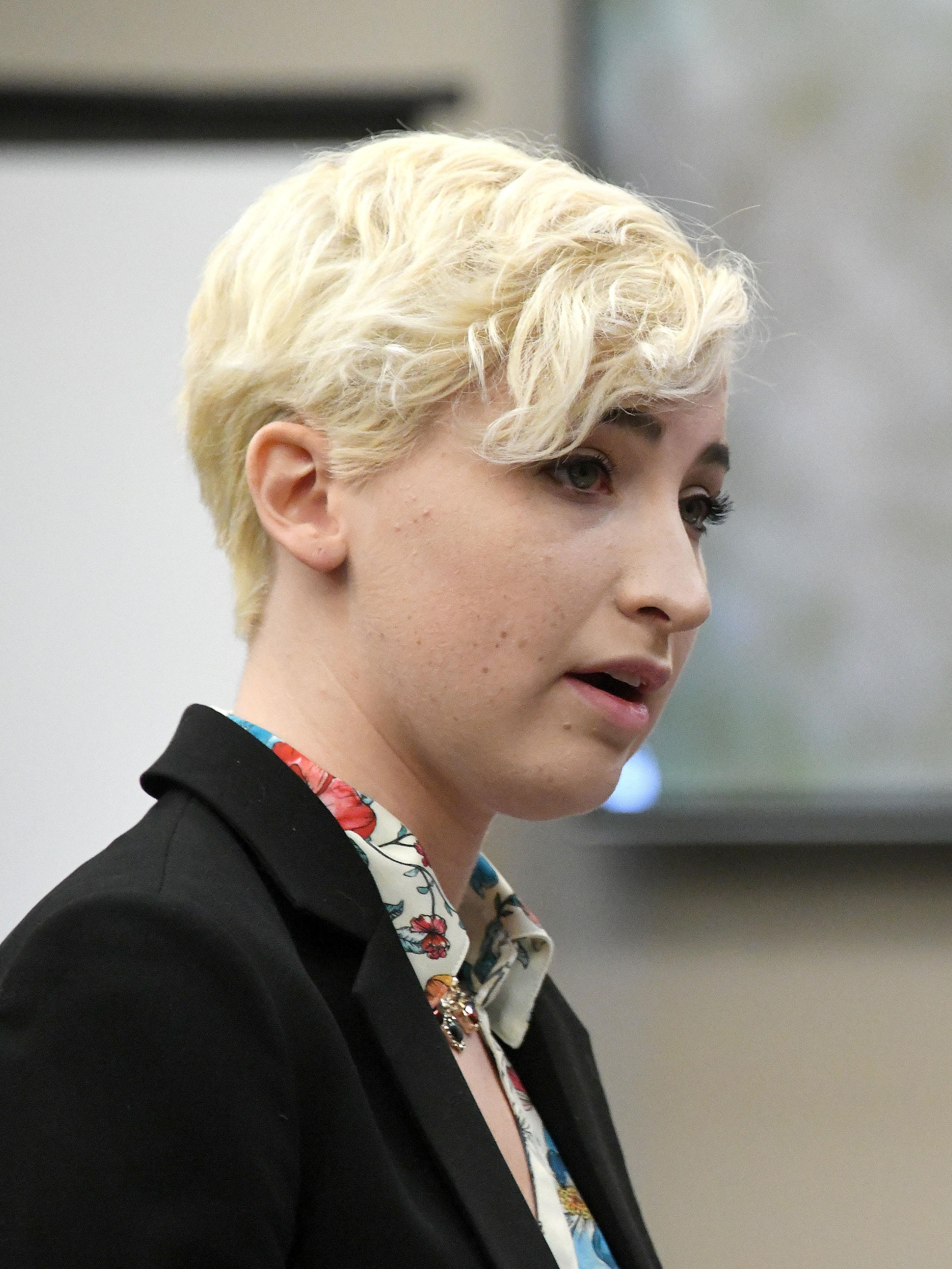Nassar accusers wish MSU deal included apology
 Kim Kozlowski
Kim KozlowskiLike others who accused Larry Nassar of sexual assault, Amanda Thomashow appreciates the historic settlement that victims reached with Michigan State University.

But she believes that achieving reforms at MSU remains paramount.
That's why Thomashow wanted Michigan State to reopen her 2014 Title IX investigation, which cleared Nassar of any wrongdoing, as part of the $500 million settlement between MSU and 332 young women.
She wanted official records to reflect that she was assaulted by Nassar, the former MSU and USA Gymnastics doctor who is now one of the world's best-known serial pedophiles.
"We all know he did," Thomashow said. "Denying that basic truth makes me worried about how committed they are to actual change."
But Thomashow's lawyers weren't able to negotiate a reopening of her case during the recent mediation over lawsuits that allege the university did not do enough to protect her and other women from Nassar.
Thomashow's call for justice was among other non-monetary demands that Nassar's accusers did not get as part of the deal, prompting concern from some about how much MSU will change its campus culture after the settlement is finalized.
"For me, it was never about money," Thomashow said. "It was about changing the atmosphere on campus and ending the cycle on campus when they still maintain they didn’t know about Nassar until 2016."
READ MORE: Archive of coverage of the Larry Nassar scandal
A Detroit News investigation found at least 14 MSU staff members received reports of Nassar's misconduct in the two decades he worked at the university.
In the wake of the mediation process, which concluded last month, some confidential, behind-closed-doors conversations has trickled out from both sides.
Among the things that were not included in the settlement: a formal apology from MSU.

"It's unfortunate but it leaves work to be done," said Morgan McCaul, a Nassar accuser and University of Michigan student. "We’re fortunate that we have the power of the Spartan community's collective voice on our side. We can and should keep pushing for those changes."
Observers such as John U. Bacon, an author of 10 books on college athletics, said it reflects poorly on MSU that the school did not include an apology in the settlement.
“They have shown no compassion, no understanding, no sense of urgency in fixing what is wrong,” Bacon said. “The very qualities that led them into this mess are the very qualities that they are displaying now, which is arrogance.”
Typical reasons for not offering an apology is to avoid vulnerability to more lawsuits, and a higher settlement, Bacon said. But, he added, MSU had already reached a monetary figure.
“It's just mean-spirited,” Bacon said. “MSU should have apologized because they were wrong. Their employee assaulted their students. People at Michigan State knew about this and did not act appropriately … Turns out human beings like being treated like human beings and that is what is missing here.”
Three days after Ingham County Judge Rosemarie Aquilina sentenced Nassar to a 40-175 years in prison, the MSU Board of Trustees apologized to his victims.
"We must also acknowledge that there have been failures at MSU, not only in our processes and operations, but in our culture, and we are united in our determination to take all necessary steps to begin a new day and change the environment at the university," Board Chairman Brian Breslin said on Jan. 27.
"I am sorry. We made mistakes," said Trustee Dianne Byrum. "Never again can this happen. Never again ...”
Added Trustee Brian Mosallam: "There are no words to express the regret in my heart … We have a long road ahead of us."
McCaul said she was at the meeting where that occurred, and that was not what she and other Nassar accusers wanted from MSU.
"Those apologies were made to us that we had gone through the abuse," McCaul said. "They were personal and they did not attribute any accountability to MSU."
MSU spokeswoman Emily Guerrant said she was unable to reach any of the university attorneys involved in the settlement, including Robert Young, the school's chief negotiator during mediation.
She added that she didn’t know how or if these issues were considered during the settlement.
“The entire university is sorry for everything that the survivors have been through,” Guerrant said.
When she stepped down Jan. 24, Simon apologized to Nassar's victims in her resignation letter.
"The last year and a half has been very difficult for the victims of Larry Nassar, for the university community, and for me personally," she wrote. "To the survivors, I can never say enough that I am so sorry that a trusted, renowned physician was really such an evil, evil person who inflicted such harm under the guise of medical treatment."
Meanwhile, attorneys for the victims say the monetary settlement was unprecedented and higher than the average amount that sexual assault victims get in Michigan courts.
John Manly, who represented the bulk of the women and girls who filed lawsuits, said the average settlement in Michigan for a sexual assault case is below $75,000. Most of the cases get dismissed because the state's laws have been so unfavorable to victims, he added.
The women who will be part of the Nassar settlement will typically be awarded amounts 10 to 14 times the average settlement in Michigan, he added.
"It’s a massive victory for the survivors," Manly said.
He also noted the package of 27 bills that passed the Michigan House recently was inspired by the Nassar case. Though not all of the bills passed, Manly said winning reform in a state's statute of limitations is "almost unheard of."
In certain cases of sexual misconduct, the bills would extend the criminal statute of limitations to 15 years, the civil statute of limitations to 10 years past the age of majority or three years after the abuse was discovered.
While Manly declined to discuss non-monetary demands that were part of settlement mediation, he said mediation always involves give and take, and that the financial terms send a strong message by themselves.
"When you pay half a billion dollars, people don’t forget what you did," Manly said.
Still, some say the lack of non-monetary provisions in the settlement reflects a disturbing lack of change in the university's mindset about sexual misconduct.
They point to the comment Interim President John Engler made after the settlement, when he said only a handful of the more than 300 Nassar accusers attended MSU.
Trinea Gonczar, one of Nassar's accusers, said she was abused by Nassar when she was 9 years old and went to MSU's sports medicine clinic, where Nassar worked. Many other young women saw him when they were children and at the same clinic, she said.
"A lot of stuff that happened to these girls was not age-level of university," Gonczar said. "When you have something called Michigan State University sports medicine, that is a direct avenue of Michigan State. That is still direct involvement,"
Establishing Michigan State's accountability has been a goal among Nassar's accusers for a long time, which is why everyone wanted a formal apology, she said.
"They just don't want to take any accountability for their involvement," Gonczar said. "Every time they keep making statements, it's more victim-shaming, like they didn't do anything wrong. They could have done things right: Apologized, teamed up with us and we could have been a force to be reckoned with."
Gonczar, the fund development director for the Wayne County Sexual Assault Forensic Examiner's Program, said there is a reason many sexual assault victims don't come forward — and may continue to avoid reporting abuse at Michigan State -- because of leadership's attitude throughout this ordeal.
"There's lot of forms of victim-shaming, and insinuating that we are liars, or we are doing things for the wrong reasons," said Gonczar, 37. "If they had taken some time to talk to us, they would have understood we wanted to help them and we wanted to help them change their culture and we wanted to help them learn from this mistake. Instead, it's been them versus us."
kkozlowski@detroitnews.com
(313) 222-2024
Twitter: @kimberkoz